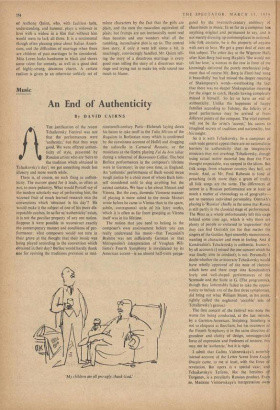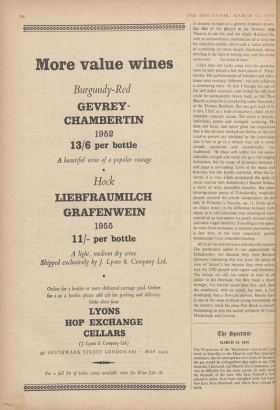Music
An End of Authenticity
By DAVID CAIRNS THE justification of the recent Tchaikovsky Festival was not that the performances were 'authentic,' but that they were good. We were offered authen- ticity of style, presented by Russian artists who are 'heirs to the tradition which obtained in Tchaikovsky's day'; we got something much less illusory and more worth while.
There is, of course, no such thing as authen- ticity. The narrow quest for it leads, as often as not, to mere pedantry. What would Purcell say of the modern scholarly way of performing him, the wizened fruit of much learned research into the conventions which 'obtained in his day'? He would make it the subject of one of his more dis- reputable catches. In so far as 'authenticity' exists, it is not the peculiar property of any one nation. Suppose it were possible to reconstruct exactly the contemporary manner and conditions of per- formance: what composers would not turn in their grave at the thought that their music was being played according to the convention which obtained in their day? Berlioz would hardly thank one for reviving the traditions prevalent in mid- nineteenth-century Paris—Habenek laying down his baton to take snuff in the Tuba Minim of the Requiem (a Berliozian story which is confirmed by the eyewitness account of Halle) and dragging the saltorello in Carnaval Romain, or the musicians at the Opera playing J'ai du bon tabac during a rehearsal of Benvenuto Cellini. The best Berlioz performances in the composer's lifetime were in Germany; in our own time, in England. An 'authentic' performance of Bach would mean rough justice by a choir most of whom Bach him- self considered unfit to sing anything but the easiest cantatas. We hear a lot about Mozart and Vienna. But the cosy, domestic Viennese manner of playing is more suited to the- music Mozart wrote before he came to Vienna than to the spare, subtle, contrapuntal style of his later works, which it is often as far from grasping as Vienna itself was in his lifetime.
The notion that you need to belong to the composer's own environment before you can really understand his music—that Toscanini's Brahms was not sufficiently German or that MitropoulOs's interpretation of Vaughan Wil- liams's Fourth Symphony is invalidated by its American accent—is an absurd half-truth propa-
'A'Iv hildren are all pro-ugly, shank God.'
gated by the twentieth-century snobbery of chauvinism in music. In so far as a composer has anything original and permanent to say, and is not merely dressing up commonplaces in national- istic folk costume, he is the property of anyone with ears to hear. We get a great deal of cant on this subject. The other day at the Wigmore Hall, after Kim Borg had sung Haydn's 'She would not tell her love,' a woman in the row in front of me knowingly delivered the purely mechanical judg- ment that of course Mr. Borg (a Finn) had 'sung it beautifully' but had missed the deeper meaning of Shakespeare's words—overlooking the fact that there was no deeper Shakespearian meaning for the singer to catch, Haydn having completely missed it himself. So let us have an end of authenticity. Unlike the happiness of happy families according to Tolstoy, the felicity of a good performance may be arrived at from different points of the compass. The vital element will not be the artist's 'accent,' his access to imagined secrets of tradition and nationality, but his insight.
So it is with Tchaikovsky. In a composer of such wide general appeal there are no nationalistic barriers 'to authenticity that an imaginative musician may not overleap. Tchaikovsky, though using actual native material less than the 'Five thought respectable, was steeped in the idiom. But folk songs, from whatever country they hail, are music. And, as Mr. Paul Robeson is fond of preaching (with more than a grain of truth), all folk songs are the same. The differences of accent in a Russian performance are at least as much a matter of chronologyas of geography— not to mention individual personality. Oistrakh's playing is 'Russian' chiefly in the sense that Russia is still partly in the classical stage of performance. The West as a whole unfortunately left this stage behind some time ago, which is why there are plenty of people so enslaved to 'expression' that they can find Oistrakh (or for that matter the singers of the Golden Age) smoothly monotonous, wanting in character and even in feeling. And if Kondrashin's Tchaikovsky is authentic, Ivanov's, by all accounts (I missed theone concert which he was finally able to conduct), is not. Personally I doubt whether the aristocratic Tchaikovsky would have wholly approved of the note of rhetoric which here and there crept into Kondrashin's lively and well-shaped performances of the Serenade and the Suite in G. (The programmes, though they lamentably failed to take the oppor- tunity to include any of the first three symphonies, did bring out what William Mann, in his notes. rightly called the neglected 'sociable' side of Tchaikovsky's genius.) The first concert of the festival was none the worse for being conducted, at the last minute, by a German-American, Steil:thug. Steinberg is not so eloquent as Beecham, but his treatment of the Fourth Symphony is in the same direction of grandeur and clarity of design, unexaggerated force of expression and freshness of texture; this may not be 'authentic,' but it is right.
I admit that Galina Vishnevskaya's superbly intense account of the Letter Scene from Eug,•11 Onegin came, to me at least, with the force of revelation. But opera is a special case: and Tchaikovsky's Tatiana, like the heroines of Turgenev, is a peculiarly Russian product. Even so, Madame Vishnevskaya's interpretation owes
its deepest strength to a general dramatic power,
like that of the players in the. Moscow Arts Theatre, to see life, and not simply RuSsian life, with an extraordinary combination of a vivid eye ,for objective realistic detail and a 'sense sublime of something far more deeply interfused, whose dwelling is the light of setting suns, and the round ocean and . . . the mind of man.'
Gilds does not really conic into the question, since he only played a few short pieces of Tchai- kovsky. His performances of Schubert and Schu- mann were certainly 'different'; but each achieved a convincing unity. At first I. thought his use of the soft pedal excessive, and wished his left foot could be permanently drawn back, as Mr. Paul Beard's is when he is not playing under Stravinsky or Sir Thomas Beecham. But one gets used to it it acts, I feel, as a kind of necessary check on his intensely romantic nature. The result is dreamy, individual, poetic and strangely satisfying. He does not force, and never gives the impression, that it has all been worked out before or that his creative powers are inhibited by the knowledge that it has to go in a certain way; yet it rarely: sounds capricious and eccentrically 'on, traditional.' He plays well within his not incon- siderable strength and rarely lets go a full ringing fortissimo; but his .range of dynamics between f and pppp is astounding. Little of the music was first-rate, but this hardly mattered. After the in- terval, it is true, Gilels propitiated the gods of social realism with Kabalevsky's Second Sonata, a work of truly incredible banality. But some drawing-room pieces of Tchaikovsky., magically played, restored the artistic temperature. At the end, in Prokofiev's. Toccata, op. 11, Gilds gave an object lesson in the difference between tech- nique, in its old-fashioned; true meaning of exact control of an instruenent for purely musical ends and mere vulgar dexterity. Travelling at top speed he went from fortissimo to extreme pianissimo i a few bars of the most exquisitely grade diminuendo I ever remember hearing.
All in all the festival was a considerable success The performers added to our appreciation o Tchaikovsky, not because they were Russian.' (however interesting this was from the point of view of 'accent'), but because they were artists. And the LPO played with vigour and freshness. The strings are still too coarse in tone to do justice to the Serenade, but they make a much stronger, less starved sound than they used. And the woodwind, with its round, big tone, is fast developing into a first-rate section. Martin Gait, is one of the most brilliant young bassoonists in the country, while the .oboe Neil Black is already threatening to join the sacred company of Lord, Macdonagh and Craxton.



















































 Previous page
Previous page